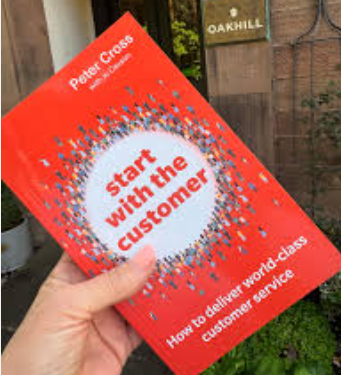Book Review - Start with the Customer
Start with the Customer - How to deliver world-class customer service Authors: Peter Cross with Jo Causon
Paul Carter
10/11/20253 min read


When I picked up Start with the Customer I was beset by flashbacks of my bad experiences of customer service. I remembered how moody I was when I wanted to finish my 9am-7pm shift at Waitrose, making it clear to the last customer in the store I was not happy to be serving her. Huffing, puffing, scanning her goods with a frown. She was more understanding than she should have been as she was a teenager once, but made it clear I owed her good customer service. She was right. I always wanted to find her to apologise but I never saw her again.
Waitrose did not need me back when I was on holiday from university. ‘Customer service matters because of its impact on our lives and communities. Service makes people feel part of something. Service makes people happier,’ writes Mary Portas in her foreword. I should also apologise to the pub worker in The Yacht in Greenwich for being short tempered when there were problems with our food order back in 2007.
Now my guilt has been exorcised I can use this review to celebrate customer service and champion the right way of challenging poor customer service and the people and companies responsible for it. A book that makes you think about your life
The authors Peter Cross and Jo Causon have rhythm and flow making it a seamless read. This is not a book about retail; it is about the essence of customer service that should resonate with all organisations.
‘Companies today are operating in a rapidly evolving business environment, set against a dynamic geopolitical backdrop. They are mindful of the need to address climate change, transition to more sustainable methods of production and distribution, and meet changing customer expectations. Meanwhile, technology is developing rapidly and having an increasing influence on our personal lives.’
The why service matters introduction sets the scene with the four pillars of The Service Nation:
1. Customer service is a business asset
2. Customer service should be recognised and respected as a profession
3. Customer service is a driver for a fairer society
4. Customer service is key to the country’s growth and prosperity
I agree with the four pillars and the push for organisations to identify and align to a shared purpose and ensure everyone’s role is designed to achieve the desired impact. One could argue that everything in this book is obvious, because good customer service is ingrained in your personality and business operating model. But, if it’s so obvious, try articulating why without reference to the insights and examples from this book.
‘The customer often stays with a product or service because they have neither the time nor the energy to go elsewhere. Without a sophisticated listening culture all eyes are on the future customer, and existing customers can become an amorphous blob, swimming in a sea of data. The organisation builds up a ‘force field’ that shields them from the uncomfortable customer truths lurking away from plain sight.’
The Covid-19 Pandemic is rivalling thinking, fast and slow for inclusion in business books. However, it would look odd if it was not mentioned in a book about customer service. When exploring the mind of the customer the four main factors affecting the customer experience are the pandemic, digital revolution, cost of living crisis and the climate crisis. They are on message and I learned a new term which I will use in my work – the expectation economy defines a customer who is better informed, less patient and more demanding than ever.
The authors do not try to write a high-end business book, having confidence in their style of writing without drowning in brackets and footnotes to show their work is based on venerated sources. They are writers with day jobs who want to get their names on bookshelves because they are passionate about what they do and want to share their knowledge. If you read internal comms channels and corporate membership magazines, you will like this book. I like their use of standalone interviews as when a book uses a newspaper interview style, it is an effort for writers and readers to present and read on a page.
My favourite chapter was Meet the customer of the future. ‘Businesses who win will no longer be defined by their product or sector, but by the role they play in enabling their customers’ lives. In the battle for share of life, there will be surprising crossovers. Don’t be surprised if the company who currently protects your home from intruders is one day measuring and delivering your made-to-measure curtains.’
Like the authors, I use and refer to time all the time in my writing. I will end the review with this excerpt: ‘Time poverty – when you feel you can’t fulfil responsibilities or engage in activities that bring you pleasure – has been on the rise for some time.’
Reading this book is not a waste of time.
Inspiration
What we talk about when we are working and living
© 2025. All rights reserved.
